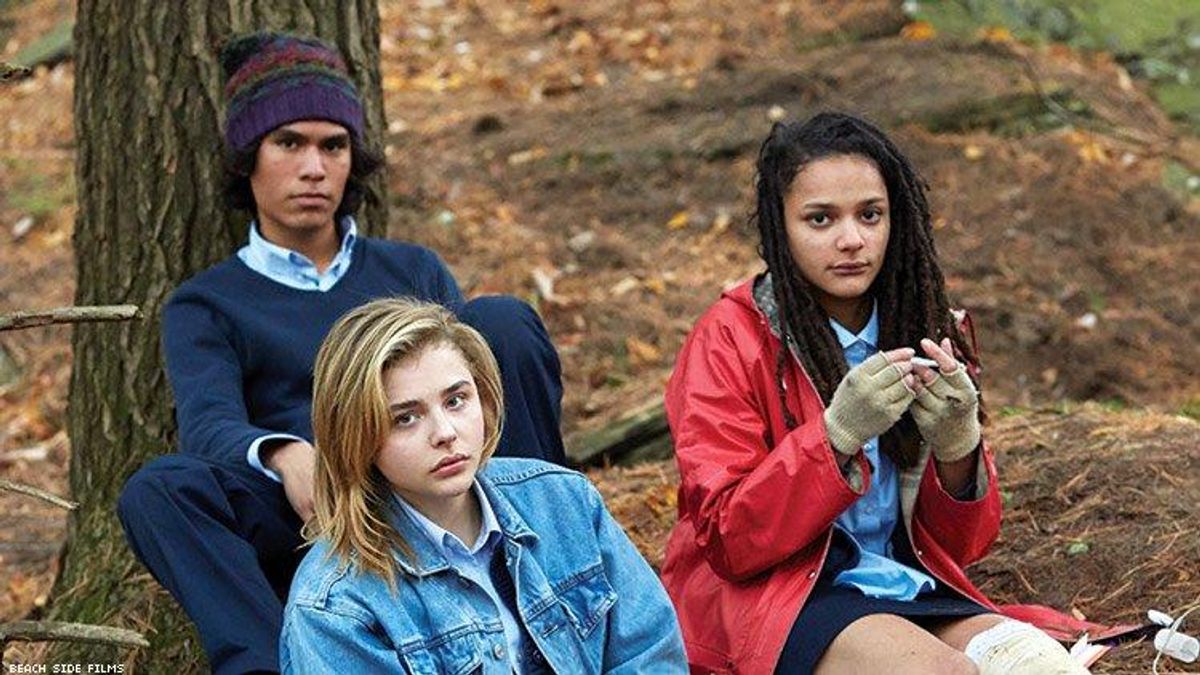Throughout The Miseducation of Cameron Post, a beguiling new independent drama, queer adolescents draw icebergs to examine the issues in their lives which have caused their homosexuality. You see, they've been told that their homosexuality - or "SSA," which stands for same-sex attraction - is caused by a multitude of unrelated personal and familial problems. An unhealthy relationship with sports. Absent parents. You catch the drift. These kids are in long-term conversion therapy, isolated in the Western wilderness. Some are enthusiastic participants, some are conflicted, and some are zen and resolutely gay. It's a fascinating little microcosm, and there is an irony in the image of an iceberg: In this film, there is little visible story to grab onto, but what's underneath it all is menacing and colossal.
Related | Chloe Grace Moretz on the Female Gaze and "the Depravity" of Mike Pence
We enter this eerie world through Cameron Post (Chloe Grace Moretz), a teenage lesbian from Montana who is caught in flagrante delicto in a car after prom. Throughout the film's wordless opening scenes, we get little sense of exactly who this young woman is, nor are we privy to any discussions about the event and her subsequent forced move. Ideally, this would permit the queer audience to compare and contrast with their own adolescent experiences, and to project their identity onto her, dropping themselves in her shoes. In this regard, Moretz is a very fine conduit. She flicks the switch on her natural radiance and commits effortlessly. I hadn't thought of her as a subtle actress before, but here she is both loose and subdued, downplaying everything nicely. It's a range-expanding part for her, and it is wonderful to watch her discover herself.
It's especially touching because Moretz plays Cameron as a young woman thwarted just as she was coming into her own. Cameron's self-image is scrambled by shame, and as a result she is permanently hesitant and evasive. Since she has little backstory, we learn a little about Cameron as we go along, and she is neither naive enough for us to fret over nor is she headstrong enough for us to root for. Her noncommittal inertia presents a problem for the movie, which is as a result not entirely engaging. This is conversion therapy. The stakes should be high. But at the film's conclusion, she remains a cipher and has become a missed opportunity.
However, the film does well when it presents a community forced together by circumstance, and friendships which must develop amidst imperceptible danger. This is also an extraordinary company of young actors, and I will single out a few. American Honey's Sasha Lane lives up to the astronomical potential she showed in her debut, playing Jane Fonda - her real name - a funny stoner who advises Cameron on how to convince her counselors she's serious about conversion. The handsome Forrest Goodluck is compelling as Adam Red Eagle, who identifies as two-spirit to the horror of his politician father. Our MVP is Tony nominee Emily Skeggs as Cameron's profoundly damaged, football-obsessed roommate, who idolizes Reverend Rick, the ex-gay counselor played by the great character actor John Gallagher, Jr.
Director Desiree Akhavan clearly relishes little moments and is always on the lookout for them. She and her skilled cinematographer Ashley Conner often let the camera linger at length on group shots of the kids, generating visually the dread and anxiety absent from the central storyline. In painfully intimate therapy scenes (with the great Jennifer Ehle), we discover obscure conversion therapy tactics drawn from real-life research and interviews. (The film is also adapted from a young adult novel of the same name by Emily M. Danforth.) Although the therapy's strategy does not penetrate our title character, the cumulative effect of these scenes should be deeply distressing, but it is diminished by the overall sobriety of the proceedings. This is a movie that carefully side-steps melodrama, but by staying grounded and naturalistic, the film also forgoes a coherent point of view, so when horrific events occur - a sickening act of violence and a secret, climactic decision - Akhavan's restraint prevents them from registering emotionally.
Restraint. Yes, perhaps that's the problem here after all. To be fair, there is wonderful restraint in Moretz's performance, but that is appropriate for a character who's afraid to show anyone much of herself. Akhavan, however, keeps herself quite removed, with a few exceptions: She puts us squarely in Cameron's point-of-view during her many sex scenes, all of which feel very true to life and contain not one moment of voyeurism. They are the magnificent highlights of this film. A long, minimally edited sex scene between Moretz and Skeggs is a genuine tour-de-force, worth the price of admission and then some. During another scene - a reference, no doubt, to a similar shot in the classic Little Darlings - we are entirely with Cameron, staring through a skylight as she has sex with a boy, disengaged. These are miraculous, touching moments which will leave an indelible mark on LGBT cinema. And they were also moments when I felt Akhavan trusting the instincts that have served her so well in her previous work. How I wish she put more of a personal stamp elsewhere, because for a queer film about conversion therapy, The Miseducation of Cameron Post feels oddly repressed.




















































































